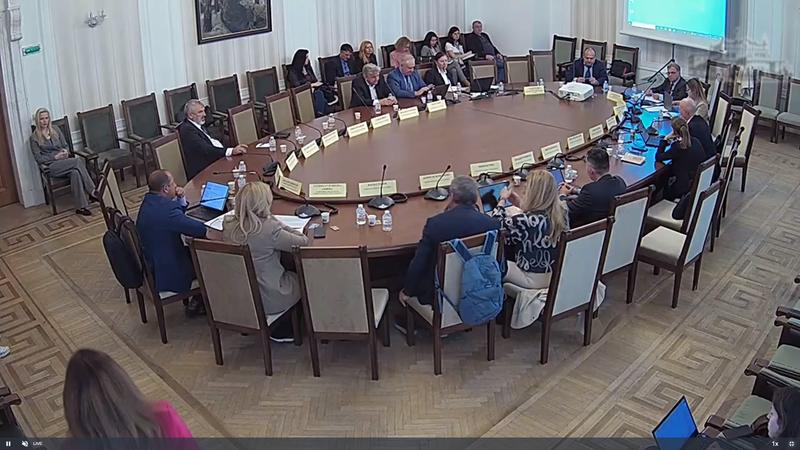In Parliament the MOEW presented proposals for legislative changes to address the problem with odours
04 Apr, 2024 | 18:57- The work of the working group established by Minister Popov received the highest appreciation by MPs from all parliamentary groups
The Ministry of Environment and Water presented today before the Parliamentary Committee on Environment and Water proposals for legislative changes to reduce unpleasant odours, prepared by the working group established by order of the Minister of Environment and Water Julian Popov.
The working group, headed by Deputy Minister Reneta Koleva, included experts from the Ministry of Environment and Water, the Executive Environment Agency (EEA) and the Regional Inspectorates of Environment and Water (RIEW), as well as the Ministry of Health (MH) and the Ministry of Regional Development and Public Works (MRDPW).
The general conclusion of the working group is that the creation of a legal framework with defined responsibilities and procedures for control by each institution is the basis for solving the problem of unpleasant odours at state level. The MOEW, the MH, the MRDPW, the Ministry of Labour and Social Policy (MLSP), the Ministry of Agriculture (MA) and the municipalities have a role to play. According to the experts, an appropriate method of odour assessment should be proposed using the factors of frequency, intensity, duration, sensitivity, and location/receptor. Changes in regulations, control measures and sanctioning of violations are needed.
Changes to the Health Act require the issuance of an Ordinance on the determination of the possible effects of odours on the health of the population, the methods and specific criteria for assessing the effects of odours, the definition of requirements and the introduction of standards to ensure the health protection of the urban environment and its adjacent territory and the designation of hygiene protection zones.
Together with this, it is necessary to develop an Odour Modelling Guide, including a definition of the term “unpleasant odour”. To initiate a change in the spatial planning of investment proposals, which would ensure an ordinance with planning requirements for investment proposals for industrial installations according to their location and distance from settlements.
It is also necessary to amend the Ordinance on Conditions and Procedure for Environmental Impact Assessment to include odours as a factor for consideration in the procedure, requiring a detailed and reasoned opinion from the health authorities.
With regard to the procedure for issuing complex permits, there is a proposal to require the preparation, implementation and regular review of an odour management plan for all installations. This plan should be the main tool for preventing, dealing with and controlling odour in industrial or waste facilities.
Reinforcement of controls is among the main measures envisaged under the powers of the relevant control authorities to limit odours from industrial installations. It is necessary to regulate specifically the control functions of the occupational health services, the structures of the MLSP and MH.
Among the legal changes proposed is the creation of a unified Methodology for detecting the spread of unpleasant odours from industrial sources, the procedure for detection and the imposition of penalties for offenders. The recommendation is that the level of penalties should ensure an effective deterrent function.
"In different countries the problem is solved differently, there is no solution at EU level, nor a uniform model", Minister Julian Popov said at the beginning of the hearing on the topic. "The issue has become urgent because Bulgarian citizens' sensitivity to unpleasant smells, noise, landscape and light pollution has increased," said the Minister. He assured that serious efforts have been made to study the problem and outline solutions. He referred to Rousse and Razgrad as examples, where odour problems have existed for years. Measures have been taken in Ruse, but the problem has not yet been resolved. Deputy Minister Petar Dimitrov relayed how the Ministry of Environment and Water had eliminated the problem of unpleasant smells in Razgrad, where the source turned out to be river pollution.
Deputy Minister Reneta Koleva presented in detail the highlights from the working group's analyses on odour assessment methods and their applications; the regulations and experiences of EU and non-EU countries on specific odour impact criteria, ceiling values, assessment methodologies, odour measurement approaches, and legislative solutions.
A review of regulations in other countries shows that Belgium, Germany and Hungary have legislation at the national level. Belgium has regulations for composting plants, Flanders has requirements for slaughterhouses, waste water treatment plants, asphalt companies, etc. In Germany, there are guidelines on odour in ambient air which set criteria for protection against unpleasant odours (from industrial and livestock facilities). These set limit values for residential and mixed areas and for commercial, industrial and agricultural areas respectively. In the Hungarian national legislation there is a definition of odour emission - it is an air pollutant or mixture of substances with an odour effect that is not clearly characterised by its components. In Austria there are no regulations at the national level, but there are guidelines for target values for spa resort areas for odour exceedances measured on a certain scale. In Italy there are several regional laws and in the Netherlands there is specific odour legislation for livestock farming only.
